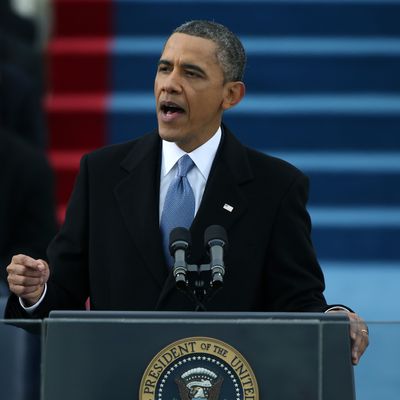
President Obama seems to be comfortable making some bolder choices now that he’s safely ensconced in a second term. Last night, he offered a not-so-radical vision of a tax code that would stop singling out hedge-fund managers and private-equity billionaires for special treatment.
The provision in question was the carried-interest loophole (also known as the “Romney Loophole”), which for years has allowed hedge-fund managers, private-equity executives, real-estate developers, and other well-off investors to classify gains made by managing other people’s money as investment income, thereby shielding it from normal income tax and getting it taxed at lower capital gains rates. Lawmakers have been trying to close the loophole for years, with little success. And even though President Obama slaughtered many tax policy sacred cows in his latest tax-reform bill, the carried-interest bonus was left oddly untouched.
Now, he sounds ready to change that.
“The average person doesn’t have access to Cayman Island accounts,” he said during an interview with CBS News before last night’s Super Bowl. “The average person doesn’t have access to carried interest income, where they end up paying a much lower rate on billions of dollars they’ve earned.”
Over the weekend, I re-read Predator’s Ball, Connie Bruck’s 1989 book about the rise and fall of Michael Milken and Drexel Burnham. Bruck rightly gives a lot of credit to Milken and his high-yield junk bonds for kick-starting the leveraged buyout industry, and making it an attractive destination for talented Wall Streeters who wanted to make more money than they could at normal investment banks. But it strikes me that equally alluring, in the early days of private equity, would have been the tax treatment. All other things being equal, if you could choose between making $5 million a year at KKR — where it would be taxed at 15 or 20 percent — and making that same amount at Goldman Sachs, where you’d pay north of 30 percent on it, why wouldn’t you want to make the jump?
Preferential tax policy may have gotten the private-equity and hedge-fund industries to where they are today. But now, closing the carried-interest loophole is a no-brainer. The loophole overwhelmingly benefits an elite investor class, while making no difference for the vast majority of middle-class families. And while the Tax Policy Center says changing the rule would raise only $13.5 billion in the next ten years — a relative drop in the bucket — it would be a symbolic gesture that would augment the president’s message about economic fairness and the end of special dispensation for the wealthy.
Making the move even easier is that many of the beneficiaries of carried interest have themselves given up defending their tax break. Prominent investors and venture capitalists like Marc Andreessen have expressed their support for taxing it as ordinary income. Private-equity firms have already begun looking for new ways to shield their income, resigned to the inevitability of the end of the loophole. The only people still adamantly defending the carried-interest-as-capital-gains special treatment are the lobbyists who are paid to do so and the reporters who take their bait.
So why hasn’t the loophole been closed already? Nobody seems to buy the lobbyists’ spin — that raising taxes on carried interest would discourage new investment. Fortune’s Dan Primack attributes a “combination of ambivalence and incompetence” among senior political leaders. Others blame the millions of dollars spent on lobbying by the likes of the National Venture Capital Association and the Private Equity Growth Capital Council. I tend to think it’s more of a delicate cost-benefit calculation for politicians. Is raising a relatively small amount of new revenue by ending an esoteric loophole that few know about worth angering the carried-interest crowd and jeopardizing campaign donations?
For President Obama, the answer has historically been “not quite.” But by signaling his willingness to take on the carried-interest crowd in his second term, perhaps the next round of budget negotiations will result in a closed loophole at last. The investment community already sees the end of the carried interest loophole as fait accompli. Why not give them the satisfaction of being right?





























